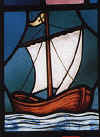- Manage
Your Money
- Luke
16:1-31
- Jan.11
We have
supposedly left the
high-flying 1980's and 1990s
decades of greed. In 1985 Ivan
Boesky was commencement
speaker at a prestigious
school of business
administration in California.
He said to the graduating
class, “Greed is all right,
by the way. I want you to know
that I think greed is healthy.
You can be greedy and still
feel good about yourself.”
Sad, yes. And the response of
those young men and women was
just as sad. They laughed and
applauded. A year and a half
later Boesky was in prison for
his runaway greed.
The two parables in our
present chapter show Jesus’
judgment on the proper use of
money.
1. Why do you like money?
2. Read Luke 16:1-18. Jesus’
parable itself is quite
straightforward. His
application, however, seems
not as clear (vv. 8b-9). At
first reading, how does he
seem to be applying the
parable to his disciples?
3. Where in the context could
you show that Jesus is not
condoning greed and
dishonesty?
4. How then are we to apply
this parable? (Try to be
specific.)
5. According to Jesus in
verses 10-15, what does our
management of money have to do
with our standing before God?
6. In verses 16-18 Jesus goes
on to accuse the Pharisees of
twisting the Scriptures in
order to justify their
actions, whether that be
piling up money or getting
around the Mosaic law on
divorce.
Read 16:19-31. In the first
part of the parable Jesus
contrasts the earthly status
of Lazarus and the rich man,
and then their different
eternal states. What does
Jesus want the Pharisees to
see about the relationship of
money in this life and in the
life after death?
7. In the second part of the
parable we learn more about
life after death (vv. 26-31).
What facts and implications do
you observe about this
dimension of existence?
8. How true to life do you
find Abraham’s observation
about skeptics (vv. 29-31)?
9. Our relatives and friends
are not all skeptics. Pray
that Jesus’ teaching on life
after death may spur you to
more personal evangelism with
those who are still open.
10. How should these parables
affect your present use of
money?
|

